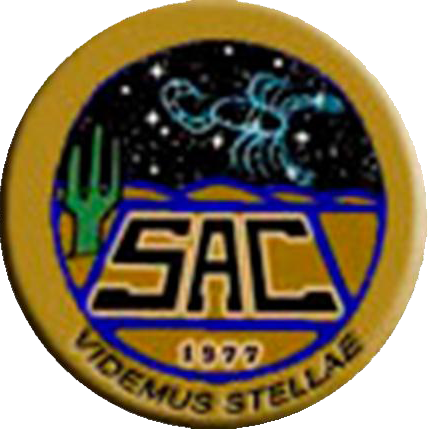Frequently Asked Questions
 |
Who Can Join SAC? |
| SAC membership is open to anyone with an interest in astronomy. From beginner to expert, all are welcome. | |
 |
Do I need to own a telescope to be a member? |
| No. Although many members own telescopes, it is not a requirement to join. In fact if you are a beginner, not owning a telescope can be an advantage. You can attend a few star parties and check out different types of scopes (our members are always willing to let you take a look and answer questions) to help you determine what will best suit your needs & budget. | |
 |
How much is membership? |
| The dues structure includes various rates for individuals, families, etc. All memberships expire in December, so if you’re a new member we pro-rate your first year’s dues on a quarterly schedule. | |
 |
What do you do at club meetings? |
| Our general meetings usually last about 2 ½ hours. During the first part of the meeting, we take care of club business and have a “Show & Tell” where our members are free to display their latest astronomical achievements. After a short break, we have a guest speaker give a talk on a subject of interest. Our proximity to major observatories & universities renowned for their astronomical research enables us to get a wide variety of interesting speakers. | |
 |
I’ve never been under a dark sky, is it ok if I come to a SAC star party before I join? |
| Yes, but we do recommend that you attend a meeting first. We have several observing sites, the closest of which is an hours drive from central Phoenix To join us please contact a board member to find out where we are going and to get directions. Also be aware of the weather. If it looks iffy, please check to see if we’re going. | |
 |
I’ve heard that beginners should start with binoculars. Can you really see anything with them? |
| Yes, you can see a lot with a good pair of binoculars. They are easy to use, offer a wide field of view (which makes finding things easier) and are affordable. A good pair of 7×50 binoculars can be had for under $150.00 and will help you learn the sky while showing you some very nice objects. Most experienced observers still keep a pair of bino’s handy, even if they own a sophisticated telescope. | |
 |
I’m new to astronomy. What do I look at? |
| There are many objects in the sky a beginner can find easily and observe. Most beginners start out observing solar system objects, namely the moon & planets. They are easy to find and can offer great detail, even in small instruments. There are also many Deep Sky Objects (DSO’s) that are bright enough to be seen with the naked eye from dark locations.
Most beginning observers will start their Deep Sky Observing with the Messier catalogue. This is a catalogue of 110 objects first catalogued by French Astronomer Charles Messier in the late 18th century. The Messier catalogue includes some of the finest DSO’s to be seen. We have several different observing programs for those interested in keeping track of their observations. The programs are geared toward both the novice & experienced observer alike. Upon completion of the program, the observer is awarded a plaque to commemorate the achievement. |
|
 |
I’m the parent of a child who has expressed an interest in astronomy. Do you have school-age members? |
| Currently, our younger members are part of family memberships. While we don’t currently have any school-age individual members, this does not mean they are not welcome! We believe that astronomy is a great family activity and encourage family membership. It is a great way to spend some quality time with your kids while enjoying the beauty of the night sky.
Bear in mind our star parties are a ways out of town so a youngster wishing to attend would need to arrange transportation to and from the observing site. Also, young folk should be mature enough to behave responsibly while at the site. |
|
| Why do you get so hostile when I call you an “astrologer”? | |
| Because astrology is based on beliefs once held as fact and in fact the SCIENCE of astronomy came about as ancient astrologers realized that the motions of the sun and planets had as their basis observable facts, not mystical or divine intervention. As astronomers we study the science of the heavens based on factual information and provable theories. |
